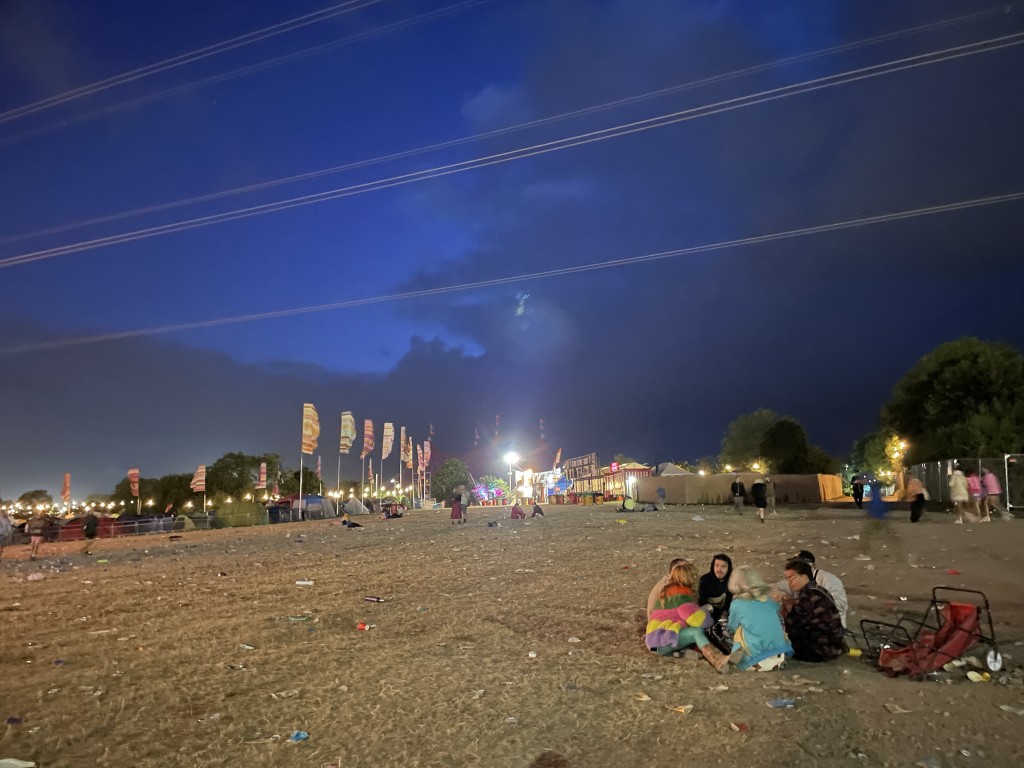Green Initiatives: A Comparison Between Glastonbury and Fuji Rock
- 7月 22, 2024 ● Experiences, From Fujirockers.org

The aftermath of Glastonbury’s main stages at 3am each night.
When it comes to sustainability, two of the world’s most iconic music festivals, Glastonbury and Fuji Rock, offer some intriguing contrasts and lessons for each other. Both festivals have made strides in reducing their environmental impact, but each has unique approaches shaped by their cultural and logistical contexts.
Glastonbury’s Sustainability Efforts
Glastonbury, held in the UK, has been a pioneer in festival sustainability:
- Waste Management: Glastonbury has a massive team of volunteers who sort through waste, using color-coded bins to ensure proper recycling. They even have an on-site recycling facility that sorts everything out.
- Biodegradable Materials: They’ve banned plastic and glass, opting for biodegradable and compostable alternatives. This helps keep the festival’s footprint low.
- Water Refill Stations: One of the standout features is the availability of free water refill stations throughout the grounds. This greatly reduces the need for single-use plastic bottles.
- Renewable Energy: The festival makes extensive use of renewable energy sources, ensuring that stages and facilities are powered sustainably.
Fuji Rock’s Approach
Fuji Rock, held in Japan, also emphasizes sustainability, but with a distinct cultural twist:
- Litter-Free Grounds: A remarkable aspect of Fuji Rock is how clean the grounds stay. Attendees take personal responsibility for their trash, adhering to the Japanese principle of leaving no trace. This contrasts sharply with Glastonbury, where staff have to clean up littered areas every night.
- Camp Chair Etiquette: At Fuji Rock, you can leave your camp chair out all weekend without fear of theft. This level of mutual respect is a testament to the festival’s community spirit. Meanwhile, at Glastonbury, reports of chair theft from campsites are not uncommon.
- Eco-Friendly Initiatives: This year, Fuji Rock has ramped up its sustainability efforts, including increased recycling and the use of eco-friendly products. They’ve partnered with local organizations to promote environmental awareness among attendees.
- Energy Conservation: The festival uses renewable energy sources, including solar panels, to power various parts of the event.
How can both festivals improve?
At Fuji Rock, despite its strong sustainability ethos, Fuji Rock doesn’t provide free water refill stations. Attendees often have to buy plastic bottles, which creates unnecessary waste. Implementing refill stations would be a major step forward. As for Glastonbury, they could take a leaf out of Fuji Rock’s book by encouraging attendees to take more responsibility for their trash. Handing out trash bags at the entrance and promoting the importance of the cleaning crew more visibly could help.
Learning from Each Other
There’s a lot that these two festivals can learn from each other. Glastonbury’s structured initiatives like water refill stations and comprehensive waste management are top-notch and could be adopted by Fuji Rock to reduce plastic waste further. Conversely, Fuji Rock’s cultural practices around cleanliness and mutual respect offer valuable lessons for Glastonbury.
Comparing Glastonbury and Fuji Rock reveals both festivals’ strong commitment to sustainability, albeit in different ways. Glastonbury’s structured and proactive measures contrast with Fuji Rock’s cultural and community-driven approach. By learning from each other, both festivals can enhance their sustainability efforts, creating greener, more enjoyable experiences for all attendees. As the festival world continues to evolve, the exchange of best practices will be crucial in achieving a sustainable future for these large-scale events.
References:
https://www.nprillinois.org/2024-06-29/can-the-worlds-largest-music-festival-be-sustainable-glastonbury-is-trying
https://www.wusf.org/2024-06-29/can-the-worlds-largest-music-festival-be-sustainable-glastonbury-is-trying



